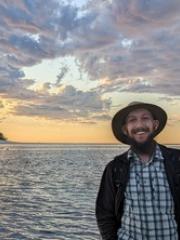Dr Timothy Staples
ARC DECRA Research Fellow
School of the Environment
+61 7 336 59154

Researcher biography
I'm a quantitative community ecologist with broad experience across terrestrial and marine systems, modern and geological time, local and global scales with both theoretical and practical focus. I'm driven by discovery, interested in myriad topics on how communities form and function, but particularly how we measure and make comparisons between communities.
- Translating anomaly detection to ecology: In a world experiencing climate change, biodiversity loss and other human impacts, detecting anomalous ecological systems accurately and early potentially offers vast benefits to conservation and ecosystem management. Anomaly detection is a fast-moving area of research applied in fields as varied as banking fraud detection, cybersecurity and cancer diagnosis. These fields deal with data as complex and incomplete as ecology, but we haven't plumbed this expertise for benefits to ecology. This is the primary focus of my DECRA.
- Grounding ecological novelty for practical use: Ecologists have been talking about novel systems for twenty years, and related topics (such as "no-analog systems") for even longer. Despite well-cited work on how "novel" can be a useful label for ecological restoration, there's a mismatch between management frameworks, which often use ad-hoc qualitative criteria, and quantitative novelty research, which has been mostly performed at global scales. Understanding how to measure novelty, how analytic choices affect measurements, and how to downscale our inferences to be practicable, has been a focus for me and my colleagues.
- The linguistic evolution of programming languages: The use of scientific programming languages like R, Python and Julia are becoming not only popular, but mandatory skills for researchers. The utility of these languages has been improved by new versions and a plethora of community-created addon packages. This approximates features of natural language evolution, where lexicon changes over time. Understanding the speed and direction of how programming languages evolve can give us a unique insight into how humans learn and alter languages, and how we might ensure they remain understandable into the future. I am currently using GitHub as a vast repository of time-stamped programming "texts", ripe for linguistic analysis.
- Community ecology through the lens of functional traits: It doesn't matter who you are, it matters what you do. That applies to organisms too. Despite decades of research into how physiology and life history strategy, often proxied through easy-to-measure "functional traits", functional ecology is still more niche than it should be. Currently my colleagues and I are exploring how a functional lens alters ecological novelty, but I am always thinking about ecology in the light of how organisms live.
